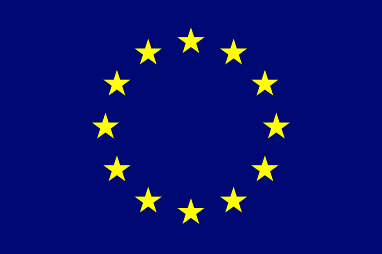Publications
Throughout the year, VOICE produces and disseminates key documents reflecting on humanitarian aid issues at the EU level and from an NGO perspective. They are addressed to decision-makers within the European institutions, at the National level, to NGO networks and other stakeholders of the humanitarian community, as well as to the VOICE members. Some documents are produced by the VOICE Secretariat with the support of VOICE members while others are publications from members and other key stakeholders in the humanitarian sector.
Please note that members-only documents will not be visible unless you are logged in.
-

Reforming the Humanitarian System- 5 Key actions the EU must take
16 June 2025VOICE position papersWith these five key actions, VOICE calls on the EU and its Member States to change the course of today’s humanitarian crisis. To use their power and resources to help build a deeply renewed humanitarian system - one that is more inclusive, fair, and accountable to all people living in humanitarian crises. -
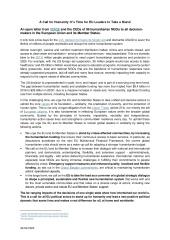
Open Letter_A Call for Humanity: It's Time for EU Leaders to Take a Stand
25 February 2025VOICE position papersFollowing the US decision to freeze its foreign aid, VOICE and the CEOs of 96 humanitarian NGOs publish an open letter calling on EU leaders to take a stand for humanity. -

Unlocking the full potential of Anticipatory Action : VOICE Position Paper
19 February 2025VOICE position papersThis position paper represents the views of the members of the VOICE Resilience-Nexus Working Group, which aims to provide the humanitarian NGO perspective on the European approach to resilience, climate change and the implementation of the humanitarian-development-peace nexus.
-

VOICE Statement - Humanitarian Action at a Crossroads: Why the EU Must Boost Funding in the Next MFF
13 February 2025VOICE position papersIn this statement, VOICE shares recommendations for the post-2027 Multiannual Financial Framework. VOICE urges the European Union (EU) and Members States to preserve the humanitarian aid budget line separate from other instruments, to allocate a minimum of €2.6 billion per year to humanitarian action, preserve the Emergency Aid REserve and finally to increase the EU Member State's national contribution to the EU revenue. -
VOICE Position Paper: The humanitarian NGOs’ perspective on climate resilience
09 December 2021VOICE position papersClimate change and environmental degradation are primary root causes of humanitarian crises around the world. In this Position Paper VOICE asks EU and Members States to scale up climate finance.
-
VOICE Grand Bargain Task Force Position Paper - An NGO perspective on the drive for efficiency in the humanitarian sector
17 November 2020VOICE position papersThis position paper sets out views expressed by members of the VOICE Grand Bargain Task Force to improve the humanitarian sector and to strive for more efficiency for the 167.6 million people in need of humanitarian intervention worldwide. There is an urgent need for European actors to follow up on the commitments made, and to put the people in need first by making our collective work more efficient. With this goal in mind, this position paper proposes recommendations to improve the efficiency of the humanitarian sector. -

VOICE Statement on the next Multiannual Financial Framework (MFF)
06 December 2018VOICE position papersThe VOICE network shares the following remarks and recommendations with the EU Member States and the European Parliament on the next Multiannual Financial Framework. -

Merging of EUAV with the European Solidarity Corps 2021-2027 - VOICE key messages
07 November 2018VOICE position papersThis paper gathers a number of remarks on the European Commission’s proposal for the European Solidarity Corps (ESC) Programme under the next financial period (2021-2027) which includes the integration of the EUAV into this larger EU Programme, building on the VOICE network’s positions over the last years. -

VOICE Statement on the next Multiannual Financial Framework (MFF) and the 2019 EU budget
09 July 2018VOICE position papersOn May 2, the European Commission(EC) released its Proposal for a Regulation laying down the multiannual financial framework for the years 2021 to 2027 and Communication ‘A Modern Budget for a Union that Protects, Empowers and Defends’ with its annex, followed on June 14 by a set of proposed regulations for external instruments. On May 23, the EC also presented its proposal for the EU budget 2019. In reaction to these proposals, the VOICE network shares the following remarks and recommendations with the EU Member States and the European Parliament. -
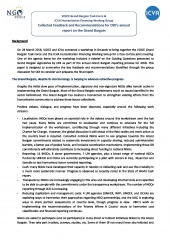
NGO Collected Feedback and Recommendations for ODI’s annual report on the Grand Bargain
07 May 2018VOICE position papersThis paper is designed to summarize the key feedback and recommendations identified through the group discussion between VOICE Grand Bargain Task Force & ICVA Humanitarian Financing Working Group, for ODI to consider as it prepares the final report. -
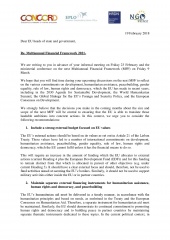
Joint letter of VOICE, CONCORD, EPLO and HRDN on the MFF 2021
22 February 2018VOICE position papersVOICE, CONCORD, EPLO and HRDN joint reccomandations on the Multiannual Financial Framework 2021 asking for strong external budget, separate instruments for humanitarian aid, humanRights, democracy and peacebuilding, more support to civilsociety and involvement of CSOs in MFF discussions -
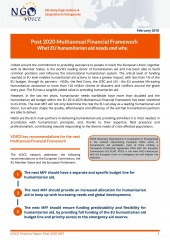
Post 2020 Multiannual Financial Framework (MFF). What EU humanitarian aid needs and why.
14 February 2018VOICE position papersVOICE position paper on the post 2020 Multi Annual Financial Framework -
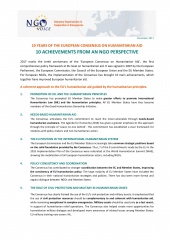
10 years of the European Consensus on Humanitarian Aid: 10 Achievements From An NGO Perspective
18 December 2017VOICE position papersTo celebrate this important statement for Humanitarian aid, we have highlighted the 10 main achievements of the Consensus implementation from an NGO perspective. -
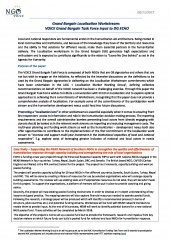
VOICE Grand Bargain Task Force paper on the Localisation Workstream
10 November 2017VOICE position papersThe Localisation workstream in the Grand Bargain (GB) generates high expectations and enthusiasm and is expected to contribute significantly to the vision to “Leave No One Behind” as set in the Agenda for Humanity. Through this paper the Grand Bargain Task Force wishes to initiate a conversation with ECHO on localisation and to explore optimal approaches to achieving the 6 commitments of Workstream. -
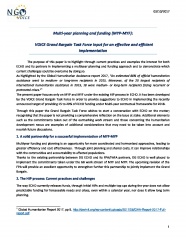
VOICE Grand Bargain Task Force paper on Multiyear Planning and Funding
31 October 2017VOICE position papersThe purpose of this paper is to highlight through current practices and examples the interest for both ECHO and its partners in implementing a multiyear planning and funding approach and to demonstrate which current challenges could be overcome by doing so. -
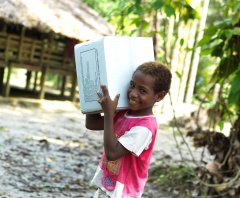
Ten years of the Consensus for humanitarian aid : Joint messages of the Event
13 October 2017VOICE position papersThe document with the joint messages to celebrate the 10 years of the Consensus on the occasion of the event the 11 of October 2017. -
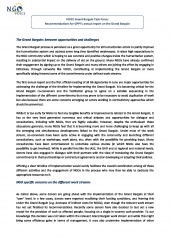
VOICE Grand Bargain Task Force recommendations to GPPI - April 2017
28 April 2017VOICE position papersThis paper highlights the opportunities and challenges NGOs perceive from the Grand Bargain implementation -
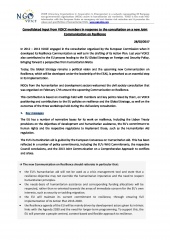
VOICE response to civil society consultation on new Resilience Communication
02 March 2017VOICE position papersIn 2012 – 2013 VOICE engaged in the consultation organised by the European Commission when it developed its Resilience Communication as well as in the drafting of its Action Plan. Last year VOICE also contributed to the EU process leading to the EU Global Strategy on Foreign and Security Policy, bringing forward a perspective from humanitarian NGOs.
Today, the Global Strategy remains a political vision and the upcoming new Communication on Resilience, which will be developed under the leadership of the EEAS, is perceived as an essential step in its implementation.
NGOs from the humanitarian and development sectors welcomed the civil society consultation that was organised on February 17th around the upcoming Communication on Resilience.
This contribution is based on meetings held with members and key points raised by them, on VOICE positioning and contributions to the EU policies on resilience and the Global Strategy, as well on the outcomes of the three workshops held during the civil society consultation. -
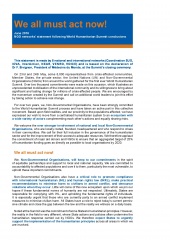
'We all must act now!' joint NGO statement following the World Humanitarian summit
20 June 2016VOICE position papersThis statement is made by 6 national and international networks (Coordination SUD, ICVA, InterAction, NEAR, VENRO, VOICE) and is based on the declaration of Dr F. Sivignon, President of Médecins du Monde, at the Summit’s closing ceremony. -
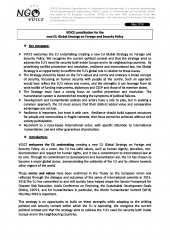
VOICE contribution to the new EU Global Strategy on Foreign and Security Policy
01 May 2016VOICE position papersIn this paper, VOICE makes recommendations for the new EU Global Strategy on Foreign and Security Policy. -
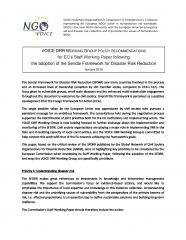
VOICE DRR WG Input to the European Commission Staff Working Paper following the adoption of the Sendai Framework for Disaster Risk Reduction
29 January 2016VOICE position papersThis paper, based on the critical review of the SFDRR published by the Global Network of Civil Society Organisations for Disaster Reduction (GNDR), aims at highlighting key priorities to be considered by the European Commission when developing its Staff Working Paper, following the adoption of the SFDRR, and ways the VOICE DRR Working Group can specifically contribute. -
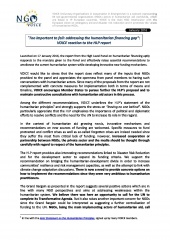
VOICE reaction to HLP report on humanitarian financing
06 January 2016VOICE position papers -
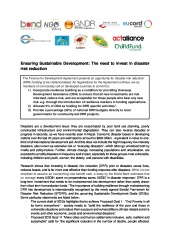
Joint CSO statement on DRR for FFD
06 July 2015VOICE position papersVOICE together with Civil society networks jointly made recommendations ahead of the Finance For Development Agreement; since it presents an opportunity for disaster risk reduction (DRR) funding to be institutionalised. We call on developed countries to commit to:
1) Incorporate resilience building as a condition for providing OverseasDevelopment Assistance (ODA) to ensure that all new investments are risk informed, reduce risk, and are acceptable for those people who bear any new risk. e.g. through the introduction of resilience markers in funding applications.
2) Allocate 5% of ODA as funding for DRR specific activities
3) Provide a percentage (50%) of national DRR budgets directly to local governments for community-led DRR projects. -
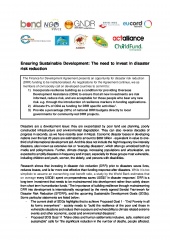
ENSURING SUSTAINABLE DEVELOPMENT: THE NEED TO INVEST IN DISASTER RISK REDUCTION - JOINT CSO STATEMENT
19 June 2015VOICE position papersThe Finance for Development Agreement presents an opportunity for disaster risk reduction (DRR) funding to be institutionalised. As negotiations for the Agreement continue, the members of civil society in this statement call on developed countries to commit to:
1) Incorporate resilience building as a condition for providing Overseas Development Assistance (ODA) to ensure that all new investments are risk informed, reduce risk, and are acceptable for those people who bear any new risk. e.g. through the introduction of resilience markers in funding applications.
2) Allocate 5% of ODA as funding for DRR specific activities.
3) Provide a percentage (50%) of national DRR budgets directly to local governments for community-led DRR projects. -
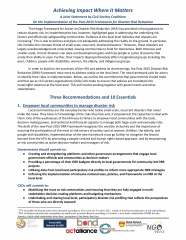
Achieving Impact Where It Matters - A joint statement by the civil society coalitions on the implementation of the post-2015 Framework for Disaster Risk Reduction
20 March 2015VOICE position papersThe Hyogo Framework for Action on Disaster Risk Reduction (HFA) has provided critical guidance to reduce disaster risk. Its implementation has, however, highlighted gaps in addressing the underlying risk factors and effectively safeguarding communities. In order to build on the successes of the HFA and address its shortcomings, the Post-2015 Disaster Risk Reduction (DRR) Framework must work to address reality at the local level. The new framework calls for actors to identify their roles in implementation. This Joint Statement outlines the commitments that governments should make and that civil society organizations (CSOs) will make to ensure that policies are translated into meaningful solutions at the local level.

